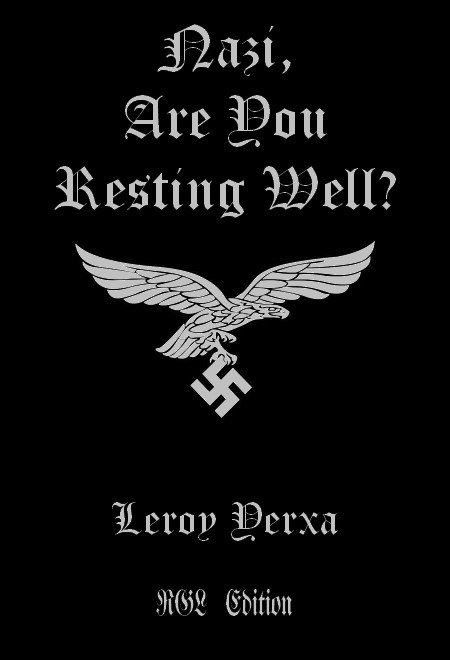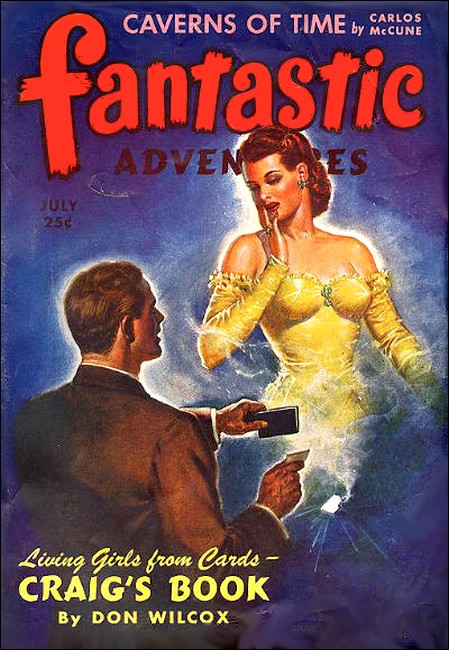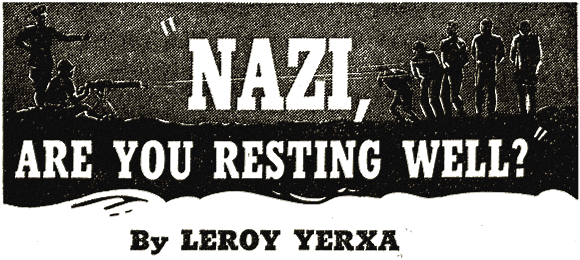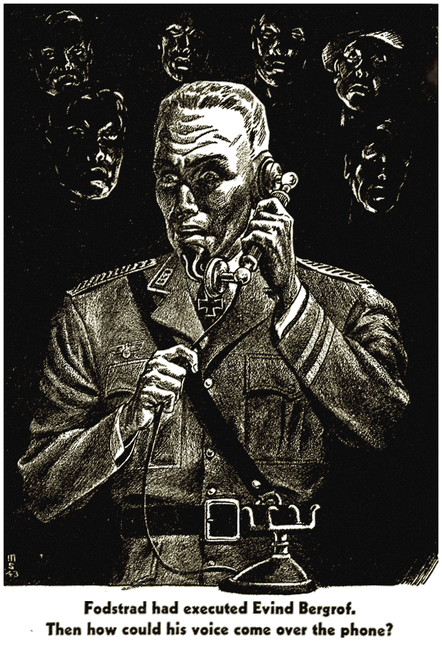
RGL e-Book Cover©
Roy Glashan's Library
Non sibi sed omnibus
Go to Home Page
This work is out of copyright in countries with a copyright
period of 70 years or less, after the year of the author's death.
If it is under copyright in your country of residence,
do not download or redistribute this file.
Original content added by RGL (e.g., introductions, notes,
RGL covers) is proprietary and protected by copyright.

RGL e-Book Cover©


Fantastic Adventures, July 1943, with "Nazi, Are You Resting Well?"


ONLY the rear wall of the building remained upright. The rest, shattered by bombs, had been leveled into a rough court. Leaving the high wall upright was Captain Hendrik Fodstrad's idea. It made a splendid place for him to carry out mass executions.
This afternoon there were a dozen Norwegian hostages standing at forced attention, their backs against the icy, rough stones of the wall. They were hardy men, eyes staring straight ahead, ready for what was to happen.
In the center of the court, Hendrik Fodstrad stood stiffly beside the three machine guns. The gunners were seated calmly. One of them puffed a cigarette. This was old business. Nasty business that was better when finished quickly.
In spite of the smart uniform, the upright military appearance of Captain Hendrik Fodstrad, he was not comfortable. His eyes, bleary from lack of sleep, studied the youngest man in the group along the wall. Fodstrad was not yet satisfied.
He walked quickly toward the line of condemned men. There was hate and defiance in their eyes. Fear that he tried to ignore welled up inside him. He paused before the blond-headed youth near the end of the wall.
"Evind Bergrof?"
"You know me well." Bergrof s expression was stony.
Anger turned Fodstrad's face white. His lips pressed into a hard line.
"You are a fool, Evind Bergrof. You cannot fight the new order. You must accept it."
"And become a Quisling boot-licker?" Bergrof sneered. "No thank you, neighbor Fodstrad. I would rather die."
Fodstrad became eager. He leaned close to the condemned man.
"If you will name the members of the band," he whispered, "I could arrange for. your life."
Bergrof drew back.
"I tell you for the hundredth time, Quisling skunk, that I murdered that German myself. He killed my father. Do you think I need an army to kill a single German? You attack in packs and expect us to do the same."
A murmur of anger came from the line of men. Fodstrad's heels snapped together sharply. With reddened face he wheeled and marched quickly to the machine guns. Turning, he raised a gloved hand smartly into the air. The men against the wall stiffened. The hand dropped.
"Fire!"
The sudden staccato bursts of the guns. The court was blue with smoke. Men dropped slowly along the wall. Slid down as though reluctant to part with life, turned and dropped forward in grotesque positions of death. No cry of fear had escaped them. They died because Evind Bergrof had avenged his father. It did not matter. If not for this, they would have died to appease Nazi wrath for some other trivial crime.
HENDRIK FODSTRAD left the court hurriedly. Evind Bergrof had been his neighbor before the Nazis came. Fodstrad had engineered many executions, but none with the nervous, frightened feeling that filled him this morning. Did Quisling, or the great Fuehrer himself, ever suffer from a guilty conscience? Fodstrad smiled. Hardly! It was the falling bodies, the stark look of death. He would forget it soon as he had the others. Was he not of chosen stock?
Hendrik Fodstrad was second in command of the organization in Trondheim. Johan Lipstead had, by his earlier contacts with Berlin, been placed directly over Fodstrad in Quisling's group.
Fodstrad reached his apartment, called Johan Lipstead and informed him that the mission had been carried out. Then he forsook the German uniform, bathed and settled down for a quiet evening. It was an interesting book. An intoxicating dream of after-war promises to the Fuehrer's followers. Yet, try as he might, Hendrik Fodstrad could not concentrate. He kept remembering Evind Bergrof.
It was at nine that the first phone call came. Afterward, he tried to explain the stark, unreasonable fear that swept over him as the bell tingled in the hall. Fodstrad arose quickly and went to the cabinet. He held the receiver to his ear. Before he could offer a greeting, a low voice spoke in his ear.
"Nazi, are you resting well? This is Evind Bergrof."
Fodstrad's hand started to shake.
"Who—what? I'm afraid I don't understand?"
The phone clicked softly and the room was still.
"Hello—hello?" Fodstrad rattled the phone. "Hello—operator!!"
"Your number, please!"
"I was cut off," he shouted. "Trace that call. This is Captain Hendrik Fodstrad."
A moment of silence, then:
"I'm sorry, Captain Fodstrad, the call came from a public booth. We are unable..."
He slammed the phone into its cradle and marched across the room to the window. His fists were clenched tightly behind his back. Blood had drained from them and the knuckles were white. He stared down into the silent street for a long time, trying to regain control of his emotions.
"Evind Bergrof," he repeated the name aloud, then pivoted and resumed his march from one side of the room to the other. "But no, it is impossible."
PODSTRAD returned to his book, and tried to forget the incident. It was exactly ten o'clock when the phone rang again. This time he approached it slowly, hesitantly.
Probably Captain Lipstead was calling with instructions for tomorrow. More executions, no doubt. Trondheim was becoming troublesome. His men hardly dared to give the Nazi salute in public since so many Norwegians had been killed.
He lifted the receiver slowly. The voice came before he could question or interrupt it.
"Nazi, are you resting well? This is Evind Bergrof."
This time Hendrik Fodstrad did not lose time by answering. He jiggled the phone quickly and shouted at the operator. Five minutes of threats and oaths followed, only resulting in complete failure to locate the booth from which the call had been placed.'
Hendrik Fodstrad was completely unnerved. He dared not call Lip-stead. Quisling's men were of iron. He, Hendrik Fodstrad, would be laughed at if he reported so trivial an incident. Beyond doubt friends or relatives of the dead Bergrof were trying to frighten him by foolish calls.
Having lost all interest in his book, Hendrik Fodstrad retired for the night. But first he made sure that the windows and doors were bolted tightly. His hands were shaking as he turned out the light by the bed.
"Nazi, are you resting well?"
That voice. That hushed, expressionless voice, came to him over and over in the darkness. He could not sleep. He could only lie there staring at the ceiling, perspiration oozing cold and wet on his forehead and in the palms of his hands.
The phone rang again at eleven, and at twelve and every hour for the remainder of the night. Each time, Hendrik Fodstrad started up from his bed at the sound, then sank back, breathing hard.
Once, close to morning, he took the receiver from its cradle and placed it on the table. Immediately the voice was in the room, low and hollow over the wire.
"Nazi, are you resting..."
He clutched the phone hurriedly and returned it to its place. The sun was already rising across the pine-clad hills east of the city. He dressed as carefully as possible and sat near the window where he could look down at an awakening city. People straggled into the streets and Trondheim awakened. Hendrik Fodstrad felt better. Without the shadows of night around him, the phone lost some of its horror. It was a new day, with new hostages to be dealt with. Gradually he forgot Evind Bergrof and the phone that reminded him of death.
THAT night and for the week of long nights that followed, Hendrik Fodstrad found no rest. The phone rang its first reminder at nine. From then on, he relived with fresh terror the hour of Evind Bergrof's death.
Not that Fodstrad didn't take precautionary measures against these disturbances. At first he placed men near various public phone booths. These military police apprehended every person who was caught using a phone on the hour. The calls continued. Occasionally, hoping that the culprit had been located, Fodstrad would answer his phone. He would wait just long enough to hear the voice and slam the phone down bitterly.
The strain was driving him crazy. The end of the first week brought a new ruling from Quisling's office. No public phone booths were to be used after nine in the evening.
It made no difference. In the apartment of Hendrik Fodstrad the phone continued its hourly ringing. He tried sleeping in the homes of friends, but the ringing phone followed him accurately and plagued him until he became terribly frightened as soon as the sun went down.
Hendrik Fodstrad had every soldier he could command rounding up hostages to pay the price of his lost sleep. He, like Quisling, worked on the theory that enough Norwegians whether guilty or not, would make up for not finding the right man.
Monday would bring the death of thirty hostages, all picked up within a short distance of public booths. A proclamation had been made of their coming death. If the voice read that proclamation, Fodstrad was quite sure he would give himself up to save his countrymen from the firing squad.
So sure was he that he stayed close to his phone on Sunday. It didn't frighten him during the day. It was at night! Fodstrad shuddered. What would he do if the man did not give up? If he was forced to kill this group in retaliation, and another and another? If the phone went on ringing through eternity?
"Br-r-r-i-n-g"
It was still light outside, not quite four o'clock. Fodstrad went to the phone eagerly. He picked it up, a triumphant grin on his face.
"Captain Hendrik Fodstrad," he snapped.
"Nazi," it was the voice, calm and sarcastic, "I understand you have searched for me?"
FODSTRAD was rewarded at last.
He had been clever enough to smoke the rat from his hole.
"I would like to meet one who is so persistently attentive," he admitted cautiously. "I suppose the news of your countrymen dying for your crime has brought you into the open?"
A quick, harsh laugh came over the wire.
"You have not been able to locate me, Hendrik," the voice went on smoothly. "It is because you do not look in the right place. May I challenge you to an interview?"
Fodstrad grinned cunningly.
"Alone?" he asked.
A hard chuckle.
"As you wish it."
Fodstrad listened closely, drawing a pencil from his pocket.
"You may come to 99 Manheim Road. I will wait there for you," the voice continued.
After the receiver clicked sharply, Fodstrad wrote the number on a slip of paper.
At last he had something to work on. A strange excitement filled him.
First, he thought swiftly, he must call Johan Lipstead. Their appointment would be postponed until tomorrow.
He tried to contact Lipstead's office but there was no answer. Swearing, he changed the number and contacted headquarters. He ordered ten soldiers to report to his apartment at once. Satisfied, he penned a short note to Johan Lipstead and left it lying on the table.
Making sure his pistol was loaded, he put on his great-coat and went out into the icy street. Ten soldiers of the German army were waiting at attention in the lobby. He returned their salute curtly and strode confidently toward the door.
99 Manheim Road
The fool had been unwise to offer such a challenge. There would be no more threatening phone calls.
JOHAN LIPSTEAD, skinny and clownish in his Nazi uniform, moved slowly about Hendrik Fodstrad's apartment. Indecision filled his watery blue eyes. He clutched the note in his long fingers, trying to place the reason for sudden fear that welled up inside of him. He read the note for the third time.
Captain Lipstead:
I regret I am unable to await your company. I attempted to contact you before urgent business called me away. We have at last brought the rat from his hole. The mysterious caller has challenged me to meet him at 99 Manheim Road. It was a brave but foolish move on his part. We will return with his body before night. Heil Hitler!
Captain Hendrik Fodstrad.
Lipstead stopped his restless pacing suddenly and his heavily veined face turned white.
"But, no! That cannot be."
He left the apartment hurriedly. Outside his car was waiting.
"99 Manheim Road. We must hurry!"
Lipstead had suddenly remembered that address. Remembered something about it that filled him with horrible fear.
The car whirled around a corner and down the bombed, deserted Manheim Road. It stopped where there had once been a tenement building, and the driver turned in his seat.
"This was 99 Manheim Road," he said, "before we bombed..."
He stopped short, eyes bulging at something he saw across the court of the destroyed building.
Lipstead opened the door quickly. With gun in hand he ran across the court, past the spot where Fodstrad's machine guns were always placed. Here was the wall where Evind Bergrof had died.
There were eleven men stretched in odd postures at the foot of the wall.
Ten of them were dressed in the uniform of the German army. The eleventh...
Johan Lipstead turned Fodstrad over until his big, sightless eyes stared up at the sky. His body was already cold.
Yet there were no wounds. Not a single bullet had touched the bodies of any of the men.
"Nazi," Johan Lipstead thought he heard a low voice whispering in the wind, "are you resting well?"
Roy Glashan's Library
Non sibi sed omnibus
Go to Home Page
This work is out of copyright in countries with a copyright
period of 70 years or less, after the year of the author's death.
If it is under copyright in your country of residence,
do not download or redistribute this file.
Original content added by RGL (e.g., introductions, notes,
RGL covers) is proprietary and protected by copyright.